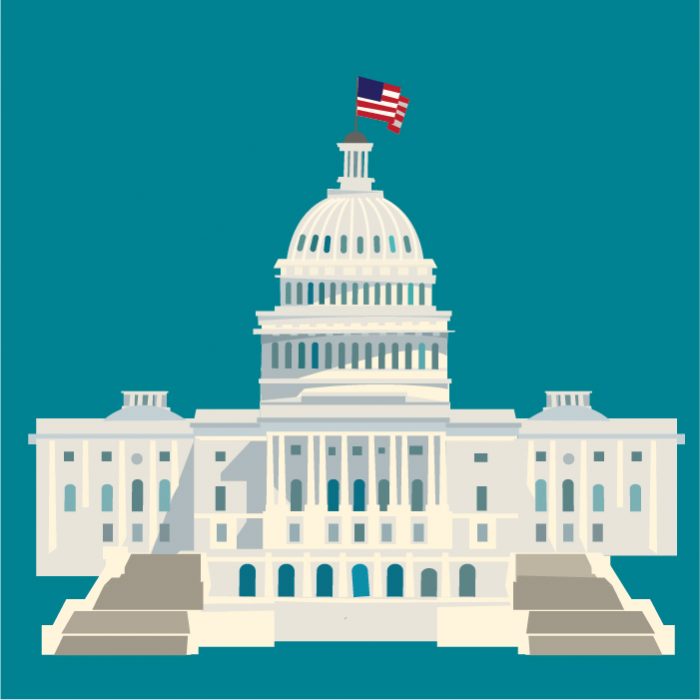This Week in Congress – March 12, 2021
Here's the scoop on what's happening this week in Congress

American Rescue Plan Act Signed into Law
On Wednesday, the Biden administration’s widely anticipated COVID-19 American Rescue Plan Act (H.R. 1319) passed Congress. The plan, considered the most consequential legislation in a generation, provides stimulus aid to millions of American’s and businesses and provides critical support to rebuild our nation’s public health infrastructure and workforce. The legislation authorizes another round of COVID relief/stimulus payments to individuals and families, extends enhanced unemployment aid through September, revises major sections of the tax code to benefit children and families, and allocates billions to speed up and expand vaccine dissemination and inoculation.
Specifically, the Act dedicates $7.7 billion to HHS to “establish, expand, and sustain the public health workforce” (including contact tracers, social support specialists, community health workers, public health nurses, epidemiologists, lab personnel, and disease intervention specialists) through awards to state and local public health departments. The plan also includes $47.9 billion for HHS activities to “detect, diagnose, trace, and monitor” COVID-19 infections. The Act also provides the CDC $7.5 billion to administer and track vaccines and vaccinations and $1 billion to strengthen vaccine confidence and education.
The president signed the bill on Thursday afternoon – exactly one year after the World Health Organization declared the exponential increase in infections a pandemic – and in his first prime-time speech that evening said he will direct states to make all adults eligible for vaccination by the first of May. He also told the public that he plans to accomplish his “100 million shots” goal in 60 days rather than the initially set 100-day plan. The exciting news, however, accompanies somber statistics from the CDC also reporting on Thursday that over 29 million people in the U.S. had been infected since the beginning of the pandemic with 470,000 in the past seven days.
Health Equity
The Biden Administration through notice for funding opportunity announced a $250 million effort through HHS’s Office of Minority Health to encourage COVID-19 vaccination among underserved populations. The new initiative, Advancing Health Literacy to Enhance Equitable Community Responses to COVID-19, funds health literacy grants to localities partnering with local community-based organizations. A webinar for potential applicants will be held on March 17, 2021 at 5:00 pm. Click here to register.
Return of Community Project Funding (a.k.a. “Earmarks”)
Following a decade-long ban-members of Congress are reviewing the prospective return of earmark funding. Senators Patrick Leahy (D-VT) and Richard Shelby (R-AL) and other members of the Senate appropriations are working a deal to revive the congressional spending tool that has historically given policymakers the power to pay for special projects within their districts. While unwilling to openly admit the value of earmarks, the president is familiar with the process – having used them to fund Dover Air Force Base in Delaware and understands their value.
The new rules are heavily limited to uphold public transparency and accountability. The reformed standards and rules include:
- Bans on For-Profit Recipients
- Caps on Overall Funding – limiting funding to no more than 1 percent of discretionary spending.
- Maximum of 10 community projects per member
- Mandatory audits conducted by the Government Accountability Office (GAO)
- Required demonstrations of community engagement and support.
- Members are prevented from pursuing projects that further their (or family member’s) financial interests.
Before revival, Republicans would have to remove their caucus-wide ban. And while the House Freedom Caucus issued an opposition statement against earmark revival, several conservative lawmakers have admitted the value.
CDC Guidance for Fully Vaccinated Individuals
On Monday, CDC issued new guidance on activities that people who are fully vaccinated against COVID-19 can safely engage in, including gathering indoors with other vaccinated people without masks. CDC recommends that fully vaccinated people follow current COVID-19 precautions when in public, when visiting with unvaccinated people from multiple other households, and around those at risk of getting severely ill from COVID-19.
Nominations / Appointments
The Senate advanced Xavier Becerra’s nomination for Secretary of Health and Human Services following Susan Collins’s (R-ME) expressed support.